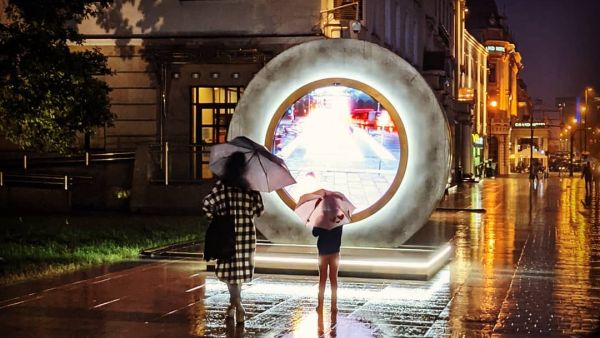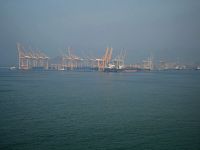By Ewelina Lepionko
The Lublin-Vilnius website on Litewski Square will help you discover yourself, new people, and create true unity in times of the pandemic.
Virtual portals were set up in Lublin and Vilnius to unite people at the difficult time of the Covid-19 pandemic and remind them that true strength lies in unity.
The 'portal' connecting Vilnius, Lithuania, and Lublin, Poland is very real, and part of a competition by the government of Vilnius to promote tourism in the area.
bbc.com
The structures erected in both cities are identical. These are concrete circles over three meters high, inside which there are huge mirrors. Instead of reflecting the image of passers-by, they display the image from the "other side" of the portal.
The project aims to connect people from different parts of the world after more than a year marked by the global pandemic, social isolation, and distancing.
kafkadesk.org
Visitors to Lublin see "live" what the cameras placed on the website in Vilnius (but cannot hear), and vice versa - Vilnius residents can look into Lublin. The cameras are mounted in the portal housing.
It looks like something out of a science fiction movie.
bbc.com
Unfortunately, the installation does not resemble the film 'Stargates' or magic portals from the world of The Witcher, but it allows us to see what is happening in a city 600 kilometers away. We can’t step through the portal and teleport to the other side. Maybe next time?
According to its creators, the aim is to make people “rethink the sense of unity” by creating a digital bridge between two far-away places.
domusweb.it
The portals in Lublin and Vilnius quickly became a tourist attraction. Almost all the world's media are writing about the idea, and Internet users demand that more portals be set up in other cities around the world.
The idea of creating "digital bridges" was born in connection with the COVID-19 pandemic, when most countries closed their borders to visitors, fearing the spread of the virus. Although the world is slowly entering a new normality and many countries are loosening their restrictions, the shaken sense of security and unity still requires reconstruction - believe the authors of the project.
The choice of Lublin and Vilnius for the pilot experiment is no mere coincidence: as futuristic as they may look, the portals are a clear nod to the shared history of Poland and Lithuania, and a reference to the Union of Lublin, an agreement signed in 1569 in that very same city which established the Polish-Lithuanian Commonwealth, one of the largest and most populous countries of 16th century Europe.
kafkadesk.org
The portals are to help the inhabitants of both cities to "connect" with other people and make them reflect on the idea of unity - we read in the announcement of the main initiator of the campaign, the Benediktas Gylys Foundation.
There are plans to add portals in other cities in the future, organizers say.







